
- 首页
- >
- 正文
Dragon boats: China Europe cultural exchange

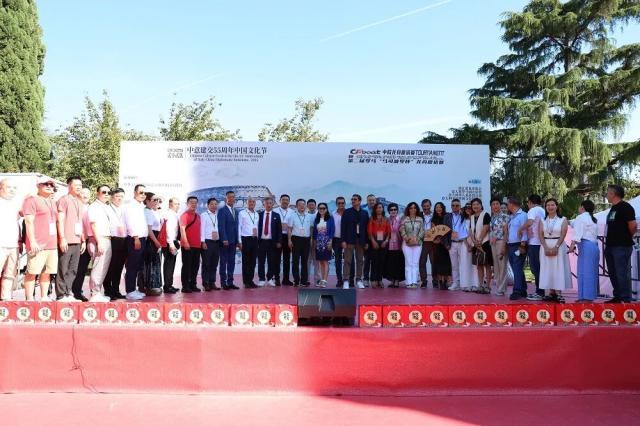
The sound of drums shattered the tranquility of the past as dragon boats raced across the waters of Rome's EUR. On September 21, 2025, the 2025 China Cultural Festival, the China-Europe Dragon Boat Invitational, and the Second Rome "Marco Polo" Cup Dragon Boat Invitational were successfully held in this ancient city. To commemorate the 55th anniversary of the establishment of diplomatic relations between China and Italy and the 50th anniversary of the establishment of diplomatic relations between China and the EU, the China Dragon Boat Association, the Chinese Embassy in Italy, and other organizations, in collaboration with local Chinese and overseas Chinese organizations, presented a meaningful "water gift." Guests including Liu Junzhu, Director of the Social Sports Center of the General Administration of Sport of China and President of the China Dragon Boat Association, joined representatives from various sectors of Rome in attending the event.
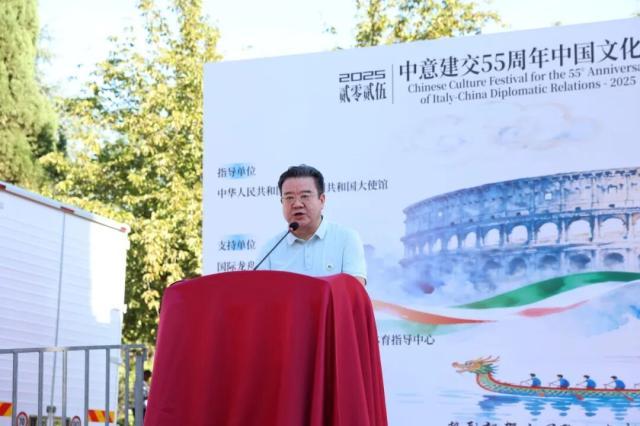
The China-Europe Dragon Boat Invitational in Rome brought together teams from overseas Chinese communities in France, Italy, and other countries, as well as dragon boat clubs composed entirely of international athletes. During the pre-race eye-dotting ceremony, red silk was spread, a brush was dipped in ink, and with a single stroke, the dragon eye "came to life," captivating the eyes of international children. This traditional Chinese ritual is quietly becoming part of the European festive experience. A delegation from the Chinese Dragon Boat Association visited Rome, Florence, and Milan during their Italian tour. In Florence and Milan, the delegation held discussions with local sports organizations and dragon boat enthusiasts, promoting Chinese dragon boat culture and discussing prospects for long-term cooperation. The Chinese Dragon Boat Association's Italian trip not only connected overseas Chinese communities with local sports organizations but also helped to establish an increasingly clear "dragon boat cultural belt" in Italy.
Europe's "Dragon Boat Fever": From Competition to Lifestyle
This year marks the 50th anniversary of the establishment of diplomatic relations between China and the EU and the 55th anniversary of diplomatic relations between China and Italy. At this crucial juncture, dragon boating not only serves as a sport to promote exchange but also becomes a vehicle for telling Chinese stories and demonstrating cultural confidence. Chairman Liu Junzhu noted that the dragon boat spirit of "standing together and striving for excellence" has inspired the Chinese people for centuries and provided a source of unity and comfort for the overseas Chinese community. "We come here with deep affection, hoping that dragon boat racing can serve as a bridge for deepening understanding and strengthening friendship between the peoples of our two countries," he said at the event, expressing his personal vision: "I hope that one day in the future, I will be able to see Italian dragon boat teams competing alongside Chinese athletes in Chinese competitions."
China and Italy are both ancient civilizations, with splendid cultures and rich histories, providing a fertile ground for exchange in traditional sports like dragon boating. Dragon boating originated in China and has now spread globally. The International Dragon Boat Federation, founded in 1991, currently has 90 member countries and regions, while the European Dragon Boat Federation has over 30 member countries, covering virtually the entirety of Europe.
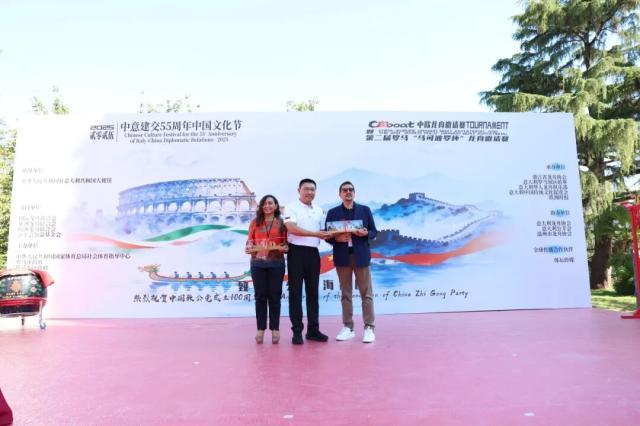
He Yi, Secretary-General of the China Dragon Boat Association, noted that dragon boating has developed rapidly in various countries, with each region developing its own distinct characteristics. For example, European and American teams excel in long-distance events, while Asian teams remain competitive in shorter distance races. Last year's World Club Dragon Boat Championships, held in Ravenna, Italy, attracted over 7,000 participants, demonstrating the strong global foundation of dragon boating.
In essence, the West's "dragon boat craze" is closely tied to its water sports traditions. European and American countries, with their passion for rowing, sailing, and rowing, have a natural foundation for developing dragon boating. A mature club system and stable membership support the sport's growth. For many international competitors, dragon boating is more than just a sport; it's a way of socializing and a lifestyle experience. They bring their families to camp by the river in their RVs, racing by day and enjoying bonfires at night. Dragon boating has become a "party sport" that blends sport and leisure.
As dragon boating becomes increasingly international, the competition system is also improving. International events such as the World Championships, the World Club Championships, and the Dragon Boat World Cup have been established, and continental championship systems in Europe and Asia are also gradually developing. Traditional events such as the Guangzhou International Dragon Boat Invitational and the Vancouver Dragon Boat Festival have continued for decades and have become global dragon boat cultural festivals. Today, the Dragon Boat Festival is not just a Chinese festival; it is a cultural feast shared by the world.
As one of the earliest countries to develop dragon boating in Europe, Italy is gradually becoming a key node on the European dragon boating landscape. Adriano Alessandrini, president of the Idroscalo Club, explained that this three-kilometer-long artificial lake, with its 91-year history and smooth waters, is ideal for dragon boating and canoeing. Italian dragon boating has flourished here for two decades, with increasingly close exchanges with Chinese teams over the past seven or eight years. The center has previously hosted numerous international water sports competitions and is currently planning a bid for the 2029 World Dragon Boat Championships.
Dragon Boating for Overseas Chinese: The Continuation of Memory and Identity
The China Dragon Boat Association's choice of Italy as a destination for this exchange is of special significance. Jin Kai, full-time Secretary-General of the Zhejiang Dragon Boat Association, stated that Milan is not only a fashion capital but also a key stage for cultural exchange in Europe. Choosing the finale there is both a response to the overseas Chinese community and a strategic consideration for cross-cultural communication. The event coincided with Milan Fashion Week and several cultural exhibitions, allowing dragon boating to intersect with fashion and art.
For many overseas Chinese, dragon boating transcends mere sport, becoming a bond that connects them to their community and cultural identity. "We row dragon boats together, gather during festivals like Dragon Boat Festival and Mid-Autumn Festival, and bring our children to experience Chinese traditions," said Guan Wei, president of the Milan "Zhonglong" Dragon Boat Club.
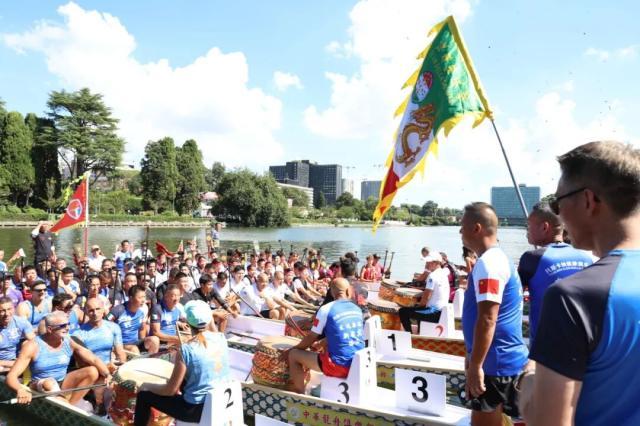
The oars dancing on the lake represent not only the oars, but also the identities and memories of overseas Chinese. 44-year-old Zhao Xiaoguang explained that the "Zhonglong" club has approximately 50 members, most of whom are from Wenzhou and Fujian, and work in Milan in industries such as wholesale, catering, manufacturing, and trade. A flexible schedule allows them to train for two to three hours every Wednesday and Saturday afternoon.
"Core strength is paramount. Dragon boating relies not just on arm strength but on the combined strength of the waist and entire body," Zhao Xiaoguang said. Therefore, he places great emphasis on physical training, even hitting the gym when the weather is inclement. "Zhonglong" training is systematic and standardized: Most of the time, 22-person dragon boats are used, but when manpower is insufficient, 12-person boats are used. Internal competitions are also part of daily training. In a recent competition, the team won silver in the 500m and gold in the 200m. "We can't say we're at the top, but we keep working hard and always achieve results," Zhao Xiaoguang said in a calm yet proud tone.
Dragon boat racing has also challenged the stereotype of overseas Chinese as "only focused on hard work and not interested in exercise." Zhao Xiaoguang admitted that with improved economic conditions, more and more overseas Chinese are willing to devote time to fitness. The club's members span several generations, from those born in the 1970s to those born in the 2000s, paddling together and finding resonance in dragon boating.
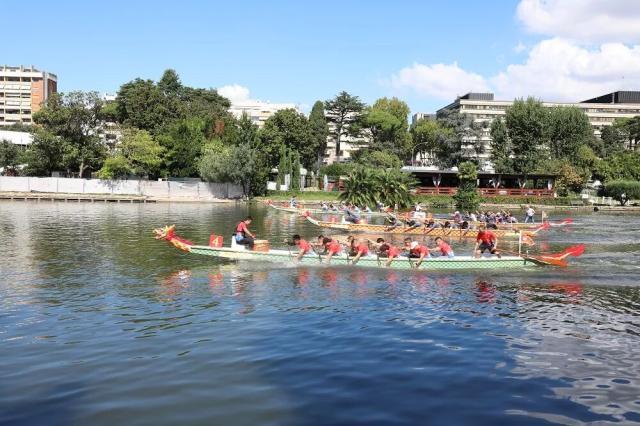
More profoundly, dragon boat racing helps overseas Chinese better integrate into Italian society. Zhao Xiaoguang recalled that many initially arrived in Italy with only a short-term plan to make a living, but as careers and families settled, and children grew up here, dragon boating became a bridge for them to connect with the local community. Because some competitions restrict nationality, the "Zhonglong" team often collaborates with local Italian clubs, competing under their names. This mutual trust and support is a concrete manifestation of cultural integration. When asked about his decision to choose dragon boating, Zhao Xiaoguang gave a simple yet sincere answer: "First, because we are Chinese; second, because I love it." Originally from Ruian, Wenzhou, he grew up watching adults rowing dragon boats during the Dragon Boat Festival. The sight of boats thronging the river and the deafening sound of drums etched a deep childhood memory. "Being able to continue rowing after arriving in Milan is like continuing that memory." Photos of dragon boat teams racing on the lake adorn the walls of the Idroscalo Club. Here, dragon boating has become a unique sight, integrated into the daily sporting life of Milanese citizens.
Sustainable Soil: Dragon Boating From Campus to Public
For dragon boating to take root globally, it requires a solid foundation. He Yi explained that professional dragon boat clubs in China first emerged in Guangdong and have now spread to Fujian, Jiangxi, Zhejiang, Jiangsu, and other regions. They are often comprised of retired aquatics athletes. Furthermore, over 100 universities across the country now offer dragon boat courses or have established teams, making university students a significant force in competitive dragon boating. Shandong Liaocheng University won 11 gold medals in the U24 category at the World Championships in Germany. Wuhan University and Huazhong University of Science and Technology, the "two stars of the same city," compete annually at East Lake. Universities like Beihua University and Northeast Dianli University also conduct regular training, serving as talent pools for national teams and professional clubs.
Dragon boat racing has a strong popular base, particularly during the Dragon Boat Festival. Over 700 officially registered races are held each month, and countless more are organized by the public, attracting over 40 million participants annually. The "Dragon Super" race in Nanhai, Guangdong, has garnered 7 billion online views, becoming a phenomenal sports and cultural event.
This surge in popularity is no accident. Since the establishment of the China Dragon Boat Association in 1985, unified rules and standards have helped dragon boat racing evolve from a traditional folk sport into a standardized modern sport. Its accessible entry points and strong sense of community have made it one of the most social and entertaining water sports. Even in water-scarce cities like Beijing, dragon boat clubs are flourishing, transforming traditional customs into urban fashion.

A differentiated competition system ensures both professionalism and mass participation: the "China Dragon Boat Competition" has strict entry requirements and is broadcast by CCTV, emphasizing both competitive spirit and effective communication; the "China Dragon Boat Open" features a mass competition at each event, promoting grassroots participation through high-quality competition.
Young people are the future hope of dragon boating. The China Dragon Boat Association has prioritized youth development during its 15th Five-Year Plan, establishing a comprehensive range of competitions from U10 to high school, and is exploring a fun-filled U6 competition. Despite limited water conditions, many schools in northern and central-western China continue to train through "land dragon boating" and "ice dragon boating." This year's National Youth Championship attracted 63 teams and over a thousand participants, with some competitions experiencing such high enrollment that quotas were required.
The participation of this younger generation has also infused dragon boating with a "national trend" vibe. Trendy brands are launching products featuring dragon boats and lion dances, and young people are eager to showcase Chinese culture while promoting the dragon's positive imagery. Unlike the "evil hegemony" dragon depicted in Western culture, the Chinese dragon symbolizes dignity, reunion, and blessing. This cultural difference has subtly strengthened the recognition of Chinese culture through the promotion of dragon boating.
"In the past, many foreigners viewed 'eye-dotting' as an Eastern symbol. Now, they understand it as a ritual to pray for good weather, peace, and prosperity, and even perform it during their own competitions," said He Yi. This shift from curiosity to understanding is a true reflection of the importance of "telling China's story well."
The Future of Going Global: The Dragon's Mission and Cultural Bridge
"It's easy to get started, but difficult to excel, but the process is incredibly fun." He Yi's summary of the characteristics of dragon boating reflects not only the experience of an athlete but also the development of the dragon boat industry. Dragon boating is not limited to competition; it embodies cultural heritage, teamwork, sportsmanship, and contemporary industry. From the "Dragon Super" of the South China Sea to the "Double Stars" of Wuhan's East Lake, from the world champions at Liaocheng University to weekend training sessions for overseas Chinese in Milan, the sound of oars continues to transcend geographical, cultural, and generational boundaries.
This year's trip to Italy further exemplifies the Chinese dragon boat's "going global" initiative. The Rome Dragon Boat Invitational brought together Chinese and European competitors, along with local foreign competitors. On race day, crowds from both sides of the Straits surged, and long lines formed at the accompanying cultural festival booths, reminiscent of an overseas temple fair. This "invitational tournament + training + cultural festival" model has the potential for further replication and expansion: international competitions are held during the day, camping parties are organized at night, and technical training for overseas Chinese teams and exchanges with local clubs are also provided. He Yi stated that these activities will continue and may be expanded to other continents—this is the responsibility and mission of Chinese dragon boating to contribute to the development of dragon boating worldwide.

He Yi admitted that his trip to Italy was deeply moving. Behind every member of the Overseas Chinese Dragon Boat Club is a story of personal struggle, patriotism, and cultural heritage. With their sweat and perseverance, dragon boating has taken root in a foreign land. "This is the most moving aspect of dragon boating—each paddle carries personal memories and connects to national culture."
Whether amidst the throngs of people along the Tiber River in Rome or amid the resounding drumbeats of Milan's Idroscalo, dragon boating brings two civilizations together in rhythm. As night falls, members of Milan's "Zhonglong" club toast together, chanting in unison: "Zhonglong! Zhonglong! The more we fight, the braver we become!" For them, this is more than just a team rallying cry; it's a spiritual homecoming that transcends national boundaries.
For overseas Chinese, dragon boating is a bond that unites their hometown; for local residents, it's a window into China; and for both China and Italy, it's a new bridge of exchange and friendship. As Liu Junzhu put it, "A dragon boat is more than just a vessel; it carries the hope of mutual learning and cultural exchange among civilizations."
Dragon boating, with an open and vigorous attitude, is sailing onto the world stage.

















